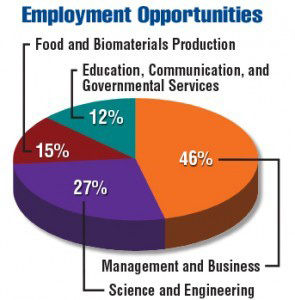During the next five years, U.S. college graduates will find good employment opportunities if they have expertise in food, agriculture, renewable natural resources, or the environment. Between 2015 and 2020, we expect to see 57,900 average annual openings for graduates with bachelor’s or higher degrees in those areas.
According to our projections, almost half of the opportunities will be in management and business. Another 27% will be in science, technology, engineering, and mathematics (STEM). Jobs in sustainable food and biomaterials production will make up 15%, while 12% of the openings will be in education, communication, and governmental services.
The projections in this report are based on data from several sources. The Bureau of Labor Statistics forecasts a 10.8% increase in the U.S. labor force between 2012 and 2022 due to job growth and openings from retirement or other replacements. We expect employment opportunities in food, agriculture, renewable natural resources, and environment occupations to grow more than 5% between 2015 and 2020 for college graduates with bachelor’s or higher degrees.
Job opportunities for food, agriculture, renewable natural resources, and environment graduates in STEM areas are expected to grow. Expect the strongest job market for plant scientists, food scientists, sustainable biomaterials specialists, water resources scientists and engineers, precision agriculture specialists, and farm-animal veterinarians.
We expect to see a strong employment market for e-commerce managers and marketing agents, ecosystem managers, agriscience educators, crop advisors, and pest control specialists.
Growth in job opportunities will vary. Employers in some food, agriculture, renewable natural resources, and environment areas will struggle to find enough graduates to fill jobs. In a few areas, employers will find an oversupply of job seekers. Employers will continue to seek to hire a diverse workforce reflective of society as a whole.
An average of 35,400 new U.S. graduates with expertise in food, agriculture, renewable natural resources, or the environment are expected to fill 61% of the expected 57,900 average annual openings. Most employers prefer to hire graduates with this expertise. However, because we anticipate more annual job openings than can be filled by these graduates, employers will need to look to other areas such as biology, business administration, engineering, education, communication, and consumer sciences to fill the remaining 39% of openings.
College graduates with expertise in food, agriculture, renewable natural resources, and the environment are essential to our ability to address the U.S. priorities of food security, sustainable energy, and environmental quality. Graduates in these professional specialties not only are expected to provide answers and leadership to meet these growing challenges in the United States, but they also must exert global leadership in providing sustainable food systems, adequate water resources, and renewable energy in a world of population growth and climate change.



